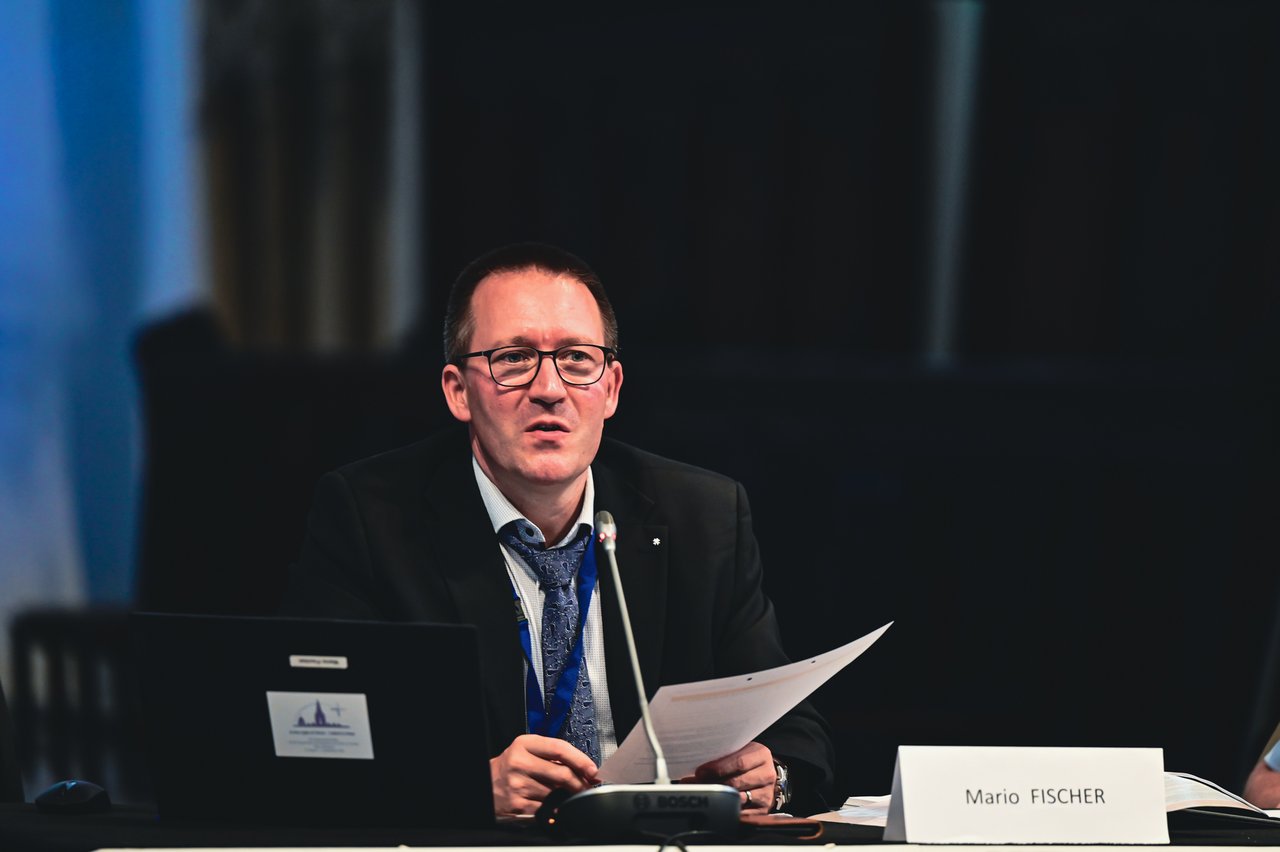The General Secretary of the Communion of Protestant Churches in Europe (CPCE), Mario Fischer, visited the Reformed Church in Hungary (RCH) in Budapest and Debrecen on November 4th and 5th. The meeting comes as a follow-up to the CPCE General Assembly held in Sibiu, Romania, at the end of August this year, which the Hungarian Reformed Churches did not attend. Fischer met with bishops József Steinbach and Károly Fekete, in addition to members of the Ecumenical Council of Churches in Hungary and representatives of the Ecumenical Advisory Board for the RCH. The visit highlighted the importance of strong ecumenical relationships, open communication, and commitment to continuing dialogue among European churches.

Photo: CPCE
On November 4th, Fischer met first with the Presidium of the Ecumenical Council of Churches in Hungary (ECCH) to present the outcomes of the 2024 General Assembly in Sibiu. At the General Assembly, delegates were presented with and discussed the outcomes of work by the council from 2018-2024 and established new working processes for 2024-2030. Notably, the outcome of the General Assembly included four statements on churches and their relation to democracy, rethinking perspectives on migration, the importance of interreligious relations and dialogue, and ecclesiastical and linguistic minorities .
Following the meeting, Fischer met with Bishop József Steinbach to discuss future cooperation between the CPCE and the RCH. Bishop Steinbach affirmed that in line with the statement on withdrawing the Hungarian Reformed delegates from the General Assembly, the RCH is committed to further cooperation with CPCE. Fischer confirmed that although the absence of delegates from the Hungarian reformed churches was regrettable, the CPCE is open to future cooperation. Furthermore, it was noted that Reformed pastor Tamás Kodácsy was elected to the CPCE council, a welcomed opportunity to ensure future collaboration between the RCH and the CPCE. Fischer and Steinbach discussed further the outcomes and future tasks CPCE will face for the upcoming 2024-2030 period, as well as highlighting the areas where CPCE would count on the contribution of the RCH, particularly advisory boards on Ethics, Ecumenism, and Education.
In Debrecen, the General Secretary met with Rev. Dr. László Gonda, Rev. Endre Iszlai, and Rev. Dr. Krisztián Kovács, all of whom are members of the Ecumenical Advisory board for the RCH. Rev. Endre Iszlai acts as a delegate of the RCH to the CPCE’s South East Europe regional group and has previously represented the RCH at the 50th anniversary commemoration gathering of Synod members of CPCE member churches in 2023.
Gathering of Synod Members of the Communion of Protestant Churches in Europe
Representatives of the member churches of the Communion of Protestant Churches in Europe (CPCE) convened in Bad Herrenalb, Germany, at the end of September commemorating the 50th anniversary of the Leuenberg Agreement. The synod members comprised nearly 60 delegates, the majority from Eastern Europe and Germany. Endre Iszlai represented the Reformed Church in Hungary and led one of the thematic workshops during the meeting.
In 2023, the Debrecen Reformed Theological University hosted an international academic conference, entitled “Being Church Together,” which commemorated the 50th anniversary of the Leuenberg Agreement. Fischer also met with the rector of the university, Béla Levente Baráth, and discussed the possibility of a presentation of the conference publication hosted in Debrecen next year as a followup to the event.
The meetings in Debrecen included a presentation on the outcomes and statements of the CPCE, as well as an underscoring of the importance of honest and respectful dialogue among members. Fischer discussed several significant points from the CPCE General Assembly, including the various working groups, the election of a new council, the statements of the assembly, and the new working processes for 2024-2030. Both Mario Fischer and the RCH representatives in Debrecen affirmed the statement of Bishop Steinbach’s office on the commitment the RCH has to its international partners and continuing its work with CPCE.
The visit of the General Secretary was a welcome opportunity to follow-up on the General Assembly and strengthen dialogue between the RCH and CPCE moving forward. The RCH looks to the future with confidence in the strengthened communications and mutual respect between the church and CPCE, as well as optimism in Tamás Kodácsy’s election to the council.
The CPCE as an ecumenical body emerged due to the Leuenberg Agreement, a historic document signed in 1973 that created the possibility of pulpit and communion among Protestant Christian churches. The Leuenberg Agreement concluded that churches are allowed differences because they appeal to the Gospel as their common basis. As a result of signing the agreement, “churches commit themselves to ‘common witness and service’ and work together to come closer to one another.” The CPCE results from this mutual commitment between churches to collaborate with one another to strengthen and unite the Protestant voice in Europe.